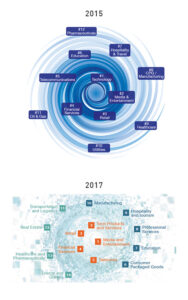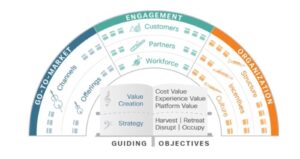
Their products and services are cheaper than yours, they offer the consumer better quality, and their global reach is unmatched. Professor Michael Wade from the Swiss business school IMD argues that digitization has brought forth ‘value vampires’ who are sucking the profit pool dry.
We see a lot of wasted effort around digital today. There is a lot of activity, but very little progress.
“Amazon, Uber, Airbnb.” Standing in the lobby of a hotel by the river in Drammen, Norway, digitization expert Michael Wade, Professor at IMD and Director of the Global Center for Digital Business Transformation, cites examples of companies he calls ‘value vampires’; companies that thanks to digitization have managed to be “winners at everything”, and who therefore are able to suck out (almost) all profit in the markets in which they operate.
“A value vampire offers products and/or services that are much cheaper than yours, often even free. In addition, the quality is better, and the service is often faster. These companies also frequently have what we refer to as a platform value that their competitors cannot match. In other words, they have a presence ‘everywhere’, making it easy for the customer to get in touch with them, no matter where that customer is located,” the professor notes.
Consulting for an offshore giant
He mentions Uber again, to drive home his point: “Not only is Uber cheaper than most of the taxi companies they are competing with, the quality is also better because of the way you can hail them via an app, and the service is good – their drivers are polite,” comments Wade, and continues:
“They also offer platform value in that you can hail an Uber almost anywhere in the world today via the same Uber app, plus they are using their network to introduce other services, such as food delivery.”
The irony is not lost on him, however, as he brings this up while visiting a country where the legal system so far has kept this particular value vampire at bay.
Wade is visiting Norway in his role as a consultant for the French-American offshore giant TechnipFMC’s Norwegian Chief Digital Officer, Ann-Christin Andersen. As a graduate of IMD, Andersen contacted Wade and his group at IMD’s Global Center for Digital Business Transformation in 2017, when she was tasked with bringing TechnipFMC into the new, digital age.
As a result of their work together, Andersen has also become the ‘heroine’ in Wade’s latest book “Orchestrating Transformation” about digitization, to be released in early 2019.
Uncharted territory
“The book is written for all the Ann-Christins out there. Basically, anyone who has ever been asked to take their corporation through a digital transformation, without having clear objectives or the tools to get there. They do not have large teams or unlimited resources, but are still expected to yield big results,” says Wade.
A year and a half into her cooperation with Wade and his academic colleagues at IMD, Andersen now feels that TechnipFMC has a clear strategy with regards to both what results digitization should yield for the offshore behemoth, and how the corporation can get to where it wants to go.
“We are enjoying the fruits of the labor that many other companies have put into the digital arena previously. We have been able to identify the right objectives, and now we also have clear strategy to get us there,” explains Andersen, as she arrives at the hotel to bring Wade to a large conference for a couple of thousand TechnipFMC employees in Norway. Wade is scheduled to present on what so-called digital disruption actually entails, and which pitfalls to avoid.
“So, has an academic perspective been useful in your real-world situation?” we ask Ann-Christen. “Certainly, when it comes to conceptualizing a territory that is as uncharted as digitization is. We now have a portfolio of concrete digital initiatives that support a strategic direction. We are getting to the point where it is more ‘hands on’, and this part we need to do ourselves,” Andersen responds.
The digital vortex

Wade uses several highly descriptive phrases to illustrate how the digitization of the business world is unfolding. He mentions the concept of a ‘digital vortex’ (see figure), as a type of tornado. All markets and industries in the world are currently being sucked into the vortex; the degree of this disruption depends on how close to the middle of the vortex – the tornado – the individual industry finds itself.
“All industries are moving towards the center of the vortex. Today, there is no longer any industry that has not been affected by digital disruption. The closer you are to the middle of the vortex, the higher the danger, and the higher the risk of disintegration. Your own industry – media – is very near the center of the vortex and is currently undergoing massive change. Is there even a difference anymore between a media company and a technology company?” Wade asks.
Digitization causes industries to break down and reform, even vertically in the value chain, as manufacturing, wholesale and retail roles become more and more intertwined.
From curiosity to necessity
When Wade published his 2017 book ‘Digital Vortex’, executives were interested but often somewhat unsure about whether digitization was relevant for them. Today, however, those doubts are gone.
“A lot has changed. When the first book was published, there was a curiosity around digital disruption. Industry executives wanted to know more about the technology and the new market entrants, the so-called disruptors. In 2019, companies no longer have to be convinced about the importance of digital disruption, nor about the need to make changes. But they are still not sure how they make this change,” the professor comments.
His new book, ‘Orchestrating Transformation’, seeks to remedy this problem. To help visualize the necessary transformation, Wade and his co-authors are introducing a digital symphony orchestra, with chords illustrating the elements required for a successful digitization, and how to avoid asynchronous and disharmonious changes.
Europe on the sidelines
Part British and employed at a European business school, Wade naturally has a European perspective when he surveys the state of digital disruption worldwide, and in that regard he is somewhat worried.
“The world is divided into the big Chinese corporations, the big American corporations, and then the rest of the world. The Chinese and the Americans are doing very well. Europe is lagging behind. Think about it. How many global technology companies are European?” Wade asks.
“None?”
“Spotify, but Spotify is still not making any money,” Wade responds.
So, what should European, or – in our specific case – Norwegian companies do?
Wade begins by explaining what not to do: “We see a lot of wasted effort within the digital space today. There is a lot of activity, but little progress. It is a mistake to focus on the digital technology itself. It may have the ‘cool’ factor, but it has little value on its own. Blockchain is an example of a tech that’s been hot. ‘This is cool, let’s get blockchain,’ people say, without really understanding what they would use it for,” Wade continues, and adds:
“The value of digital transformation comes from understanding the link between technology and how it can impact a company’s bottom line. That requires understanding how your organization needs to change. Are you organized appropriately? Are you offering up the right incentives? Do you have the right corporate culture to handle the changes that have to be implemented?”

Organizational change comes first
The initial ‘wave’ of digitization was focused on digitization of core products, and changes happened quickly within industries such as media, telecommunications, finance and IT. Some succeeded, others collapsed. According to Wade, the second wave is now upon us. This wave is not just focused on digitization of products and services, but also of business models, processes and value chains.
Andersen explains how her role as Chief Digital Officer in TechnipFMC has to a large degree entailed focusing on organizational change. In a world where changes are happening so quickly that long-term strategies are becoming less relevant, Wade preaches the concept of ‘agility’, which allows a corporation to respond quickly to the changing landscape. The obvious next question, therefore, is how to become agile?
“Agility requires three things: First of all, you need to be ‘hyper-aware’ of what is happening externally in the market, as well as internally in the company. Second, you must be able to make ‘informed decisions’, and finally, the changes must be implemented much faster than what was necessary in the past, i.e. ‘fast execution’,” Wade responds in a shortened version of what is likely a very demanding task to tackle.
A portfolio of digital initiatives
Wade expands on this by explaining that companies must keep a close eye on new competitors, technology, changing regulations and markets that can affect their business. They then have to trust their data, and use it to make decisions on whether and how to respond to trends.
To implement a transformation plan, companies must eschew bureaucracy, and allow employees across the organization to test out new initiatives. Wade contends that complex decision-making will prevent you from moving quickly enough to capitalize on innovative technological breakthroughs. Furthermore, in the event of an unsuccessful digital initiative, management should work quickly to redistribute resources to new initiatives, rather than clinging on to something that is not working.
While the international consultancy firm McKinsey argued in a recent article that digital transformation cannot happen in stages, Wade warns against ‘turning everything upside-down’. “I don’t agree with McKinsey. If you attempt to radically change everything, you will kill your company. What you have to do is establish a portfolio of digital initiatives. Some companies will find new sources of revenue and new business models. Other initiatives will be more gradual; cut costs and improve customer satisfaction. To forget about your existing business and only focus on change is a dangerous path to take,” states Wade.
What about smaller companies?
In a previous edition of Kapital we wrote about what the largest Norwegian corporations are doing in the field of digitization. Equinor, for instance, has put 1-2 billion NOK aside for digital projects over the next few years. But what about the small and medium-sized Norwegian companies, which according to The Confederation of Norwegian Enterprise make up more than 99 percent of Norwegian companies, and employ approximately 47% of all employees in the private sector? These companies cannot afford large investments or create separate business units to determine how to tackle digitization. Wade nevertheless believes that they have no choice but to also try to change.
“The fact that they do not have the same resources available to them does not mean that they can just ignore digitization. They have to change and adjust if they want to survive. We see how many small players are struggling in the retail industry at the moment. Customers are making their purchases online, at the well-known value vampire Amazon,” Wade comments. However, he does see a silver lining for small and medium-sized businesses: “The good news for smaller players is that many of the digital tools allow them to scale without a large upfront investment.”
This article was written by Roar Valderhaug and was published by Kapital, a leading Norwegian business magazine


![dd__small-teaser408x210[1] - IMD Business School - IMD Business School](https://www.imd.org/wp-content/uploads/2022/06/dd__small-teaser408x2101-370x190.jpg)